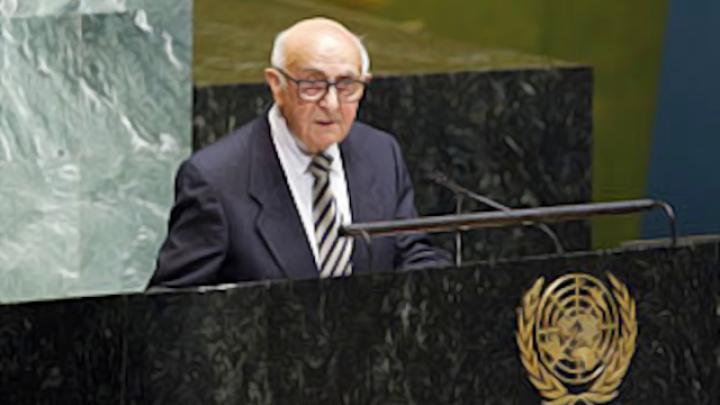President Meron presents first Annual Report to the United Nations General Assembly

President Theodor Meron today presented the first Annual Report of the Mechanism for International Criminal Tribunals (MICT) to the UN General Assembly. In his first address to the General Assembly on behalf of the MICT, President Meron reported on the MICT’s work and called on Member States to take steps to ensure that the remaining fugitives indicted by the International Criminal Tribunal for Rwanda (ICTR) are arrested and brought to trial.
President Meron reported that following the opening of the Arusha branch of the MICT on 1 July 2012 and the opening of The Hague branch on 1 July 2013, the MICT now has a presence on two continents, including offices in the United Republic of Tanzania, the Netherlands, and a satellite office in the Republic of Rwanda.
The President informed the General Assembly that the Mechanism is currently seised of one appeal from an ICTR trial judgement in the Ngirabatware case, and will hear any appeals that might be filed in the cases of Šešelj, Karadžić, Hadžić, and Mladić which are still in the trial phase at the International Criminal Tribunal for the former Yugoslavia (ICTY). President Meron also explained that, in accordance with its mandate, the MICT has assumed responsibility for a number of essential functions previously carried out by the ICTR and the ICTY, including ensuring the protection and support of victims and witnesses managing the archives of the ICTR and the ICTY.
The President emphasised that the MICT would conduct the trials of three of the nine individuals who have been indicted by the ICTR but who have not yet been arrested. The President underscored that it was ‘thanks to the dedication and cooperation of Member States that the ICTY was able to account for all 161 of those individuals whom it indicted’ – and emphasised that ‘[i]t is vital for the cause of international justice that we ensure a similar result for those indicted by the ICTR’.
In concluding, President Meron pledged to continue to seek to ensure that the MICT can serve as a model for international criminal justice and for UN institutions generally as it enters its second year, including by adopting best practices from both the ICTR and the ICTY and then building and improving on them. He reiterated that while the MICT was created to be a temporary institution, he and his colleagues at the MICT would be ‘continually focused on how to accomplish our mandate most efficiently, while remaining fair and effective’.
Established by the Security Council of the United Nations, the Mechanism is mandated to carry out a number of essential functions of the ICTY and the ICTR.